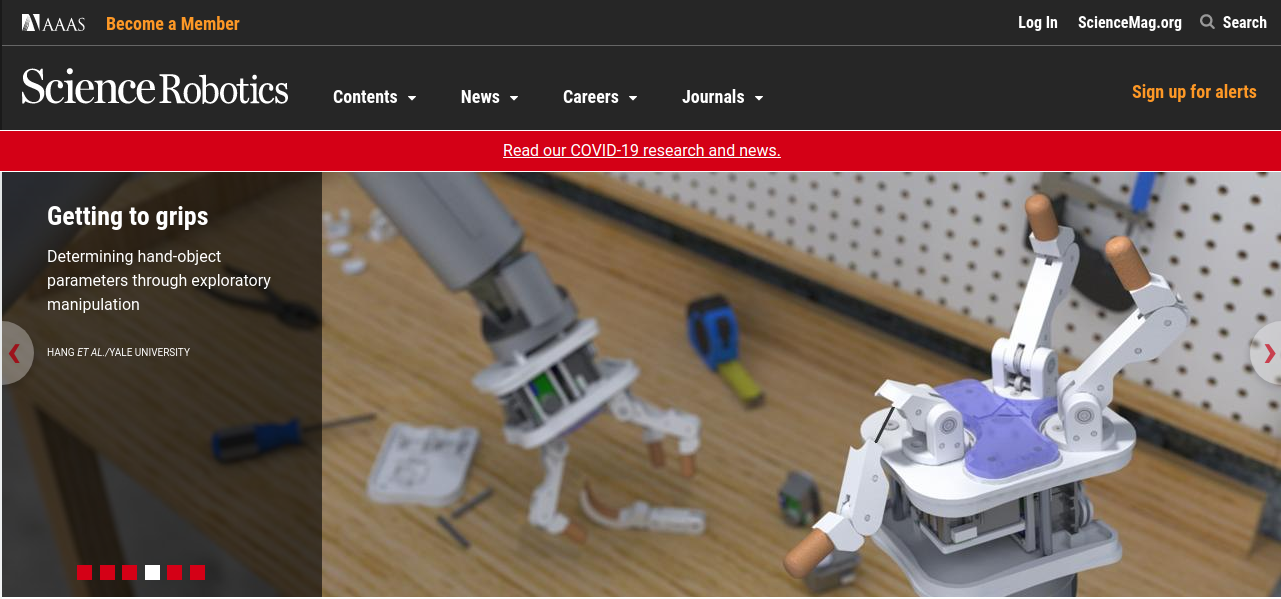Manipulation for self-Identification, and self-Identification for better manipulation
K. Hang, W. G. Bircher, A. S. Morgan, and A. M. Dollar
Science Robotics 19 May 2021:
Vol. 6, Issue 54, eabe1321
DOI: 10.1126/scirobotics.abe1321
Top 5 Editor's Picks of 2021 [Link]
Paper Access
[Link] [PDF] [bibtex]

Selected Media Coverage
TechXplore: Using a virtual linkage representation algorithm to improve functionality of a robot hand
Yale SEAS News: A robotic hand that updates itself
Science Report: Manipulation for self-Identification, and self-Identification for better manipulation - Science
Science Robotics: How can robots rely more on themselves, rather than external sensors or human operators?
MIT Technology Review (China): 中国青年科学家让耶鲁机械手拥有“自我意识”,自研算法模型,少量参数即可实现写字和走迷宫
nanowerk: A robotic hand that updates itself
K. Hang, W. G. Bircher, A. S. Morgan, and A. M. Dollar
Science Robotics 19 May 2021:
Vol. 6, Issue 54, eabe1321
DOI: 10.1126/scirobotics.abe1321
Top 5 Editor's Picks of 2021 [Link]
Paper Access
[Link] [PDF] [bibtex]

Abstract -- The process of modeling a series of hand-object parameters is crucial for precise and controllable robotic in-hand manipulation because it enables the mapping from the hand’s actuation input to the object’s motion to be obtained. Without assuming that most of these model parameters are known a priori or can be easily estimated by sensors, we focus on equipping robots with the ability to actively self-identify necessary model parameters using minimal sensing. Here, we derive algorithms, on the basis of the concept of virtual linkage-based representations (VLRs), to self-identify the underlying mechanics of hand-object systems via exploratory manipulation actions and probabilistic reasoning and, in turn, show that the self-identified VLR can enable the control of precise in-hand manipulation. To validate our framework, we instantiated the proposed system on a Yale Model O hand without joint encoders or tactile sensors. The passive adaptability of the underactuated hand greatly facilitates the self-identification process, because they naturally secure stable hand-object interactions during random exploration. Relying solely on an in-hand camera, our system can effectively self-identify the VLRs, even when some fingers are replaced with novel designs. In addition, we show in-hand manipulation applications of handwriting, marble maze playing, and cup stacking to demonstrate the effectiveness of the VLR in precise in-hand manipulation control.
Selected Media Coverage
TechXplore: Using a virtual linkage representation algorithm to improve functionality of a robot hand
Yale SEAS News: A robotic hand that updates itself
Science Report: Manipulation for self-Identification, and self-Identification for better manipulation - Science
Science Robotics: How can robots rely more on themselves, rather than external sensors or human operators?
MIT Technology Review (China): 中国青年科学家让耶鲁机械手拥有“自我意识”,自研算法模型,少量参数即可实现写字和走迷宫
nanowerk: A robotic hand that updates itself